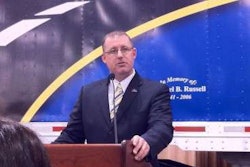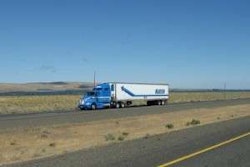“If you had asked me before the recession what would happen after, I would have said really strong growth,” Bob Costello, chief economist for the American Trucking Assocations, told attendees at a panel discussion held during ATA’s 2010 Management Conference and Exhibition in Phoenix this week. The panel was moderated by documentary host, producer and broadcaster Bill Kurtis.
But compared to the recessions that ended in 1975 and 1982, growth has been anemic, Costello said. In 1975, post recession gross domestic product grew 6.2 percent. In 1982, it grew 7.7 percent. When the most recent recession ended in June 2009, GDP was at 2.6 percent. This slow growth means “it will take until the end of 2013 to regain the jobs lost,” he said.
One reason the recovery has been so sluggish is that consumers have pulled back significantly on purchases of services, such as life insurance, meals at restaurants and travel, said David Huether, chief economist of the National Association of Manufacturers. The slow recovery has edged private sector job growth down to 50,000-60,000 jobs per month
“I think unemployment will go to 10 percent or higher,” he said. And because businesses remain concerned about the underlying strength of the recovery, along with potential tax increases and pending greenhouse emissions rules, the recovery will continue “at a sluggish pace,” he said. “We won’t get back to fourth-quarter 2007 levels until the fourth quarter of 2011.”
Manufacturing has seen some growth – about 8 percent since last June – due in part to tax credits such as those for first-time homebuyers and purchasers of energy-efficient appliances, but the pace of growth seen earlier this year “will not be repeated in the second half,” Huether said. Overall, manufacturing will continue to grow slightly higher than the rest of the economy but still at a sluggish 2 percent pace, he said.
Consumer spending, which accounts for two-thirds of GDP, has been in a steady decline since March after a slight uptick at the beginning of the year, said Scott Krugman, vice president of industry public relations for the National Retail Federation. Given all of the information consumers have access to, “everyone knows we’re out of the recession,” he said. “But I don’t think consumers are buying it yet.”
In response, retailers are managing their businesses as though the recession is ongoing, he said, keeping inventories low and doing lots of sales promotions. Consumers are beginning to look at some big-ticket items such as electronics, but only will buy based on certain conditions, primarily price, he said. “Consumer confidence won’t return to normal until unemployment, housing and credit improve,” he said. He predicts holiday sales, however, will increase about 2.3 percent, up from .4 percent last year and from a -3.9 percent decline in 2008.
Although economic growth will continue to be slow, trucking is well positioned for the years ahead, Costello said, primarily because of tightening capacity. “We have never seen so much supply come out of this industry. It’s now going to start to pay dividends,” said Costello, who predicts failures will stay high over the coming months. While Class 8 truck sales currently are low, “replacement demand alone will keep truck makers busy over the next couple of years,” he said, although most carriers will not be adding trucks due to the high cost of equipment and financing.
“Even though demand isn’t going to increase much, I think this industry is going to do really well,” he said. “Next year at this time, we’ll be at the cusp of some of the best years in trucking.”











